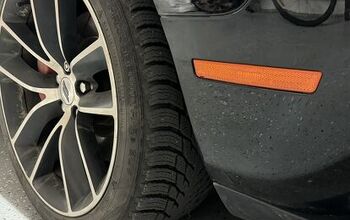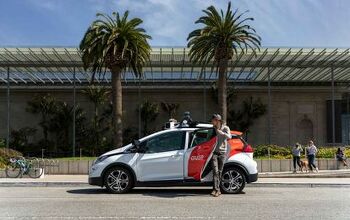Rear Suspension Failures Continue to Plague Ford, Prompting a Dual Recall

This isn’t the first recall for Ford vehicles with rear ends that may step out of line, but it’s certainly the largest. On Wednesday, the automaker announced the recall of 1.2 million Ford Explorers in the U.S. out of fear that rear suspension toe links could fracture, leading to a loss of control.
The recalls covers 2011-2017 Explorer models, with Ford saying the issue has already caused one driver to veer into a curb. Over the past three years, several suspension recalls have dogged this generation of Explorer; the cause of the potential fractures ranged from improper welds to the accumulation of a certain type of mud.
Speaking of that mud, it’s more of a menace than originally thought. In a separate recall, Ford today called for the return of four Ford and Lincoln models sold in Canada to replace vulnerable rear toe links.
The largest recall covers 1.2 million ’11-’17 Explorers sold in the U.S., plus another 28,000 Explorers of the same age range in Canada. Apparently there’s a lone Explorer roaming around Mexico with this issue, too.
“Vehicles that are exposed to frequent full rear suspension articulation (jounce and rebound) may experience a fractured rear suspension toe link,” the automaker said in a release. “A fracture of a rear toe link significantly diminishes steering control, increasing the risk of a crash.”
The rougher the roads, the more likely it is that your Explorer’s rear end is about to get loose. Once recalled, dealers will replace the left and right rear suspension toe links with a new, forged unit and align the suspension.
In 2016 Ford recalled 75,364 Explorers and Police Interceptor Utility models from the 2014 and 2015 models years for the exact same problem. One accident and one injury resulted from the issue, Ford said.
Spring of 2017 brought another recall, though this one was located north of the border. In a strangely regional effort, Ford recalled a slew of 2013-2017 police and civilian Explorers in three flat Prairie provinces (Alberta, Saskatchewan, and Manitoba) for replacement of rear suspension toe links. The reason given was “unique mud accumulation in the rear frame pocket where the rear suspension toe link attaches to the frame, impeding articulation of the toe link, which may result in toe link fracture.”
Later that year, 2011-2012 Explorers joined the Canadian recall for the same issue, bringing the total number of affected units to 24,114. Three accidents and one injury resulted from the problem.
Now, the automaker wants to examine and replace rear toe links on four additional models in those three provinces. While Ford didn’t mention mud, one can assume it’s behind the recall of the 2010-2017 Ford Taurus, 2009-2017 Ford Flex, 2009-2015 Lincoln MKS, and 2010-2017 Lincoln MKT models in that same region. The total number of recalled vehicles amounts to 12,000, with one accident and injury cited by the automaker.
Like the Explorer recall, these vehicles will leave the shop with forged rear toe links in place.
In a twist of fate, the recalls come as Ford holds a press junket in the wilds of Oregon for the 2020 Ford Explorer — a model that’s (thankfully) new from the ground up.
[Images: Ford]

More by Steph Willems
Latest Car Reviews
Read moreLatest Product Reviews
Read moreRecent Comments
- CEastwood I have a friend who drives an early aughts Forrester who refuses to get rid of it no matter all it's problems . I believe it's the head gasket eater edition . He takes great pains regularly putting in some additive that is supposed prevent head gasket problems only to be told by his mechanic on the latest timing belt change that the heads are staring to seep . Mechanics must love making money off those cars and their flawed engine design . Below is another satisfied customer of what has to be one of the least reliable Japanese cars .https://www.theautopian.com/i-regret-buying-a-new-subaru/
- Wjtinfwb 157k is not insignificant, even for a Honda. A lot would depend on the maintenance records and the environment the car was operated in. Up to date maintenance and updated wear items like brakes, shocks, belts, etc. done recently? Where did those 157k miles accumulate? West Texas on open, smooth roads that are relatively easy on the chassis or Michigan, with bomb crater potholes, snow and salt that take their toll on the underpinnings. That Honda 4 will run forever with decent maintenance but the underneath bits deteriorate on a Honda just like they do on a Chevy.
- Namesakeone Yes, for two reasons: The idea of a robot making decisions based on algorithms does not seem to be in anyone's best interest, and the thought of trucking companies salivating over using a computer to replace the salary of a human driver means a lot more people in the unemployment lines.
- Bd2 Powertrain reliability of Boxer engines is always questionable. I'll never understand why Subaru held onto them for so long. Smartstream is a solid engine platform as is the Veracruz 3.8L V6.
- SPPPP I suppose I am afraid of autonomous cars in a certain sense. I prefer to drive myself when I go places. If I ride as a passenger in another driver's car, I can see if that person looks alert and fit for purpose. If that person seems likely to crash, I can intervene, and attempt to bring them back to attention. If there is no human driver, there will probably be no warning signs of an impending crash.But this is less significant than the over-arching fear of humans using autonomous driving as a tool to disempower and devalue other humans. As each generation "can't be trusted" with more and more things, we seem to be turning more passive and infantile. I fear that it will weaken our society and make it more prone to exploitation from within, and/or conquest from the outside.



































Comments
Join the conversation
The metallurgy of the parts provided by a lowest-cost supplier could be the culprit here. Sometimes they take... shortcuts... in order to eke a profit out of their business. Quality control testing should be beefed up, because this kind of recall gives the company black eye after black eye. Short-term profits of this type at the expense of long-term sales ruin reputations and market shares.
Presumably this is sorted out for the 2020 Explorer? I'm strongly considering buying one this summer as a three-row family hauler.